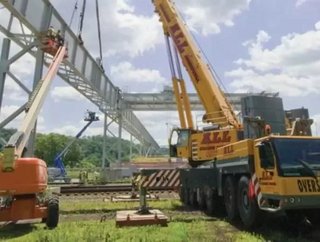ALL Erection leads North American crane operations

Before you read this, check out this story in November's issue of Supply Chain Digital. Trust us, it's way cooler!
You could say that ALL Erection & Crane Rental Corp. “put up the Ritz” in Chicago.
One of the largest privately owned crane sales and rental companies in North America, ALL helped transform the Windy City’s skyline by building a 40-story landmark Ritz-Carlton Residences on Michigan Avenue.
It wasn’t easy, as ALL had to overcome the logistical challenges that surround building such a tall structure in a city like Chicago that’s notorious for its high winds.
Thanks to the company’s rich crane background and its bevy of technological innovations, ALL’s fleet is well suited for both construction and supply chain challenges in today’s world.
“The ALL family of companies is equipped, staffed and ready for any tall order,” Rick Mikut, ALL’s Crawler Crane Manager said.
CONSTRUCTION ON CHICAGO'S RITZ-CARLTON RESIDENCES
ALL has witnessed major growth since being founded in Cleveland in 1964. Originally started by brothers Michael, Jake and Larry Liptak, the company has since built its own engine, weld, paint and support shops to handle its crane fleet.
The crawler crane is the most in-demand type of crane, and one that ALL works extensively with. Crawler cranes are mobile and run on tracks around a job site, offering incredible stability while lifting a load, without the need for outriggers.
It’s that kind of versatility and sound design that made the crawler the crane of choice in ALL’s Chicago operation.
“Crawlers are stronger and more stable at greater distances than some other crane types,” Mikut explains. “Crawlers provide pick-and-carry capabilities, heavy-duty lifting and long-term economic advantages for work as building construction, bridges and roads.”
ALL’s crawler fleet includes cranes with capacities ranging from 80 tons and up. Fleet management would be an issue having such a large and diverse fleet, but the company handles it with surprising ease.
“The ALL fleet is one of the world’s largest, most modern and most technologically advanced,” Mituc said. “The company keeps investing in its fleet, far outpacing its competition in maintenance and acquisition.”
The company has three 1,000-ton machines, including the Manitowoc model 21000, the largest of ALL’s crawler fleets, and one that Mikut is particularly proud of.
“The Manitowoc 21000 is the world’s most easily mobilized 1,000-ton crane,” Mikut said. “Its eight-crawler system allows swing and travel with full load and minimizes ground-bearing pressure.”
MANITOWOC CRANE VIDEO
Not surprisingly, the technology behind a crane like the Manitowoc 21000 is staggering. Engineers have to determine the ground-bearing pressure on job sites when working with such a heavy piece of equipment to prevent dangerous cave-ins on soft ground.
ALL’s team is working with crane manufacturers around the world to implement new technology in each crane introduced. Onboard computers add ease to crane operation and help increase safety.
Technology is only a start when it comes to operation, however.
“Make no mistake – technology is simply an aid – it’s the operator’s skill, training and experience that really matter,” Mikut said. “Automation and technology alone never could prevent a mishap. A safe, successful pick takes expert lift planning and a highly skilled operator to interpret the data and the signals the technology provides.”
While ALL doesn’t build its own cranes, the company serves as one of the largest customers to crane manufacturers and is often called on to offer input to new crane design.
Among the company’s latest technological advancements is a new diesel engine designed to meet United States EPA Tier 4 emissions standards for non-road diesel equipment.
The Tier 4 models are an improvement from the current Tier 3 models, and “will have further improved emission-control technologies (that) are said to be nearly smokeless,” Mikut said.
“Overall, the company believes in being stewards of our environment,” Mikut continued. “Through the next decades, we plan to continue to address sustainability, implement improved technology, recycle materials and do what we can to save energy and natural resources for future generations.”






